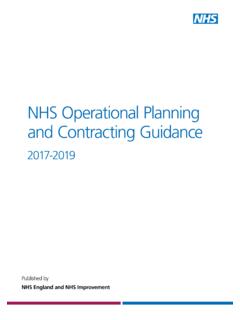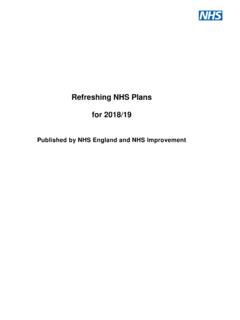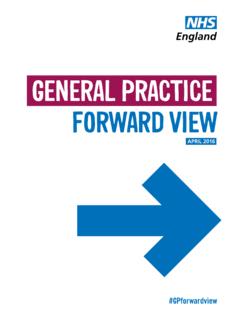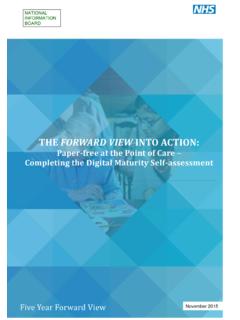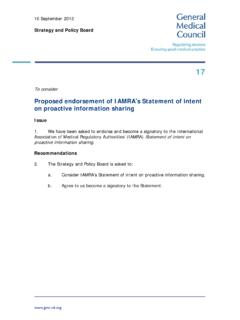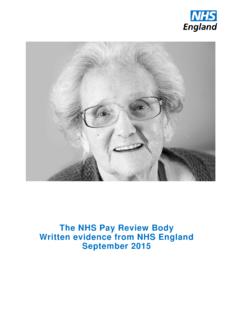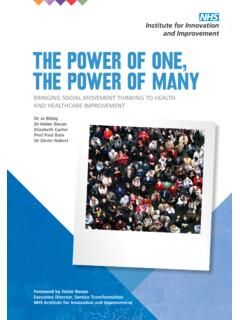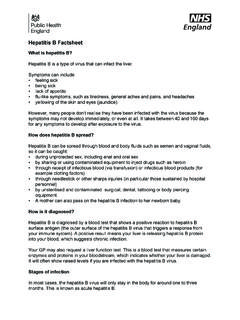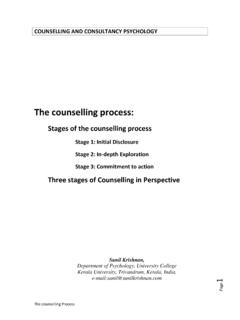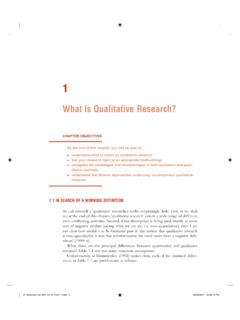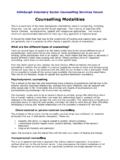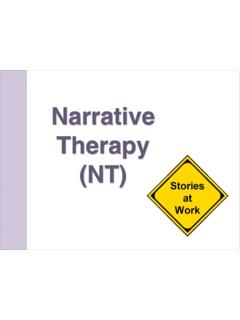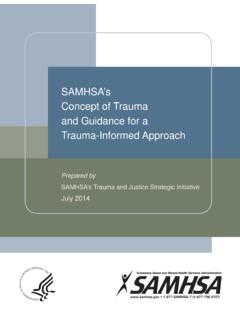Transcription of Understanding different bereavement practices and how our ...
1 Our NHS PeopleUnderstanding different bereavement practices and how our colleagues may experience grief21st December 2020 Drafted by the National Health and Wellbeing Team, NHS England and NHS NHS employs over million people who make up a diverse workforce from all different walks of life. There are many different cultures, religions and beliefs celebrated across the organisation and as such, it is essential that line managers understand how to support colleagues in a compassionate and inclusive manner when colleagues are experiencing a bereavement . Given the impact Covid-19 has had on the general population, particularly those from BAME communities, we know that our NHS people are likely to experience a bereavement during the pandemic.
2 This could be through losing patients when working on front-line services, as well as experiencing personal bereavements of family members, friends and colleagues who have died during the pandemic. In addition to this, the previous rules around lockdown and social distancing will have had an impact on how colleagues grieve or celebrate the life of a lost one. It is possible that next year will see a lot of memorial services in lieu of funerals. This document aims to encourage and support line managers to be compassionate leaders who consider the different ways in which our colleagues may experience a bereavement , and what practices different religions and cultures may follow. It is asked that readers note that this guidance is meant as a starting point, providing an overview for line managers.
3 Some of the descriptions in this guidance may provide a simple overview of what can be a challenging and complex time for individuals. Colleagues are asked to recognise that not all staff who relate to one of the religions or cultures outlined in this document will follow each practice discussed. Across all religions and cultures there will be variances in how they practice and it is important to communicate with colleagues and encourage open and honest conversations where staff feel comfortable sharing their beliefs. This guidance may also be a valuable resource for staff wishing to learn more about the cultural beliefs and practices their patients, families and carers may wish to follow when experiencing a for line managersWe are all individuals and the ways in which we deal with death and grief can vary.
4 When a colleague approaches their line manager to advise of a bereavement , line managers should feel equipped to support them in a compassionate and empathetic managers are invited to use this resource to learn more about the bereavement practices of different religions and cultures, and how they can then support colleagues experiencing grief or bereavement , noting the cultural differences experienced by our diverse workforce, all of whom have been subject to government restrictions impacting on their normal grieving practices . Our diverse workforce also includes a number of colleagues who have family members living abroad and may need to travel abroad to attend a funeral. Allocating one day of compassionate leave to attend the funeral in this instance would not be beneficial, and consideration should therefore be given to the time it may take for colleagues to travel abroad to attend funerals.
5 It is also likely that given the current pandemic and restrictions on travel, colleagues may not be able to visit family for several months and therefore may wish to take compassionate leave later in the year, when they are able to mourn with their family. Line managers must not assume that because of an individuals affiliation to one specific belief system that they will follow all of the principles outlined in this resource. Communication is key to finding out what matters to them as an individual. Similarly, our NHS colleagues may relate to more than one culture or religion and the way in which they practice their beliefs may be different to what is outlined in this resource. As a line manager it is important to get to know your colleagues and remember that each person will have different needs.
6 bereavement or compassionate leaveThere is no statutory recommendation on how many days an organisation should offer staff for bereavement or compassionate leave, however the NHS Terms and Conditions and a number of local HR policies suggest five working days, at the discretion of a line manager. This means, for example, if a bereavement has particularly impacted the health and wellbeing of a staff member, if they need time off to adjust to changes to their caring responsibilities, or if they need additional time to travel abroad to attend a funeral, line managers can compassionately approve the extension of leave to support that individual. Line managers are encouraged to demonstrate compassionate leadership when colleagues request bereavement leave, taking into account the personal situation of the colleague asking for support.
7 It is possible that the colleague requesting compassionate leave is wishing to attend the funeral of an auntie who raised them, and therefore the loss to them is like that of losing a parent or guardian. Demonstrating compassionate leadership will create cultures where staff feel supported at work and where colleagues feel able to openly talk about their beliefs and experiences, without concern of being judged. Anyone classed as an employee has the statutory right to time off if:their child is stillborn from 24 weeks of pregnancy or dies under the age of 18 (in April 2020, a new legal right called Jack s Law mandates that parents who suffer the loss of a child aged under 18 will be entitled to two weeks statutory paid leave),a dependant dies, for example their partner, parent, child, or someone else who relied on them.
8 For line managers and colleaguesWhen a colleague informs you that they are going through a bereavement . Express your condolences and make it clear that they are not expected to work on the day that their loved one has died. Be aware of your local HR policy on bereavement or compassionate leave, and speak with the colleague to consider how much time they may need to make funeral arrangements or fulfil religious or cultural traditions, such as attending a funeral or care for dependants. Identify the way in which they would prefer you to keep in touch. Ask them how much they would like you to tell their colleagues about their a colleague is ready to return to work. It is possible that a colleague may request a phased return to work or to work flexible hours to help support their transition back to work.
9 In this instance, line managers should remember that each colleague is different and how you support them will vary dependant on their individual circumstance. Be open to flexible working provisions. Flexible working options can be particularly helpful to bereaved employees in the short and longer term, particularly if the bereavement has led to changes in personal circumstances, such as caring responsibilities. Consider a phased return to work. A phased return to work is a way of enabling employees to return to their duties in a gradual way. It is typically adopted following illness or injury through an occupational health referral, but it can also be helpful for providing a supportive and manageable return for those that have been bereaved.
10 If a bereaved staff member returns to work on a phased basis, they will work a reduced number of hours at first, followed by a gradual increase in workload until they reach their normal number of hours. A phased return to work usually lasts anywhere between two and six weeks but can be extended if necessary. A phased return to work plan should cater to the bereaved staff member and their specific needs. Be sensitive to requests for time off. It is important to be sensitive to and accommodating of requests for time off where possible, especially around anniversaries or other special memorial events. for line managers and colleaguesWhen a colleague returns to work after a bereavement . Talk to the colleague about their wellbeing.
